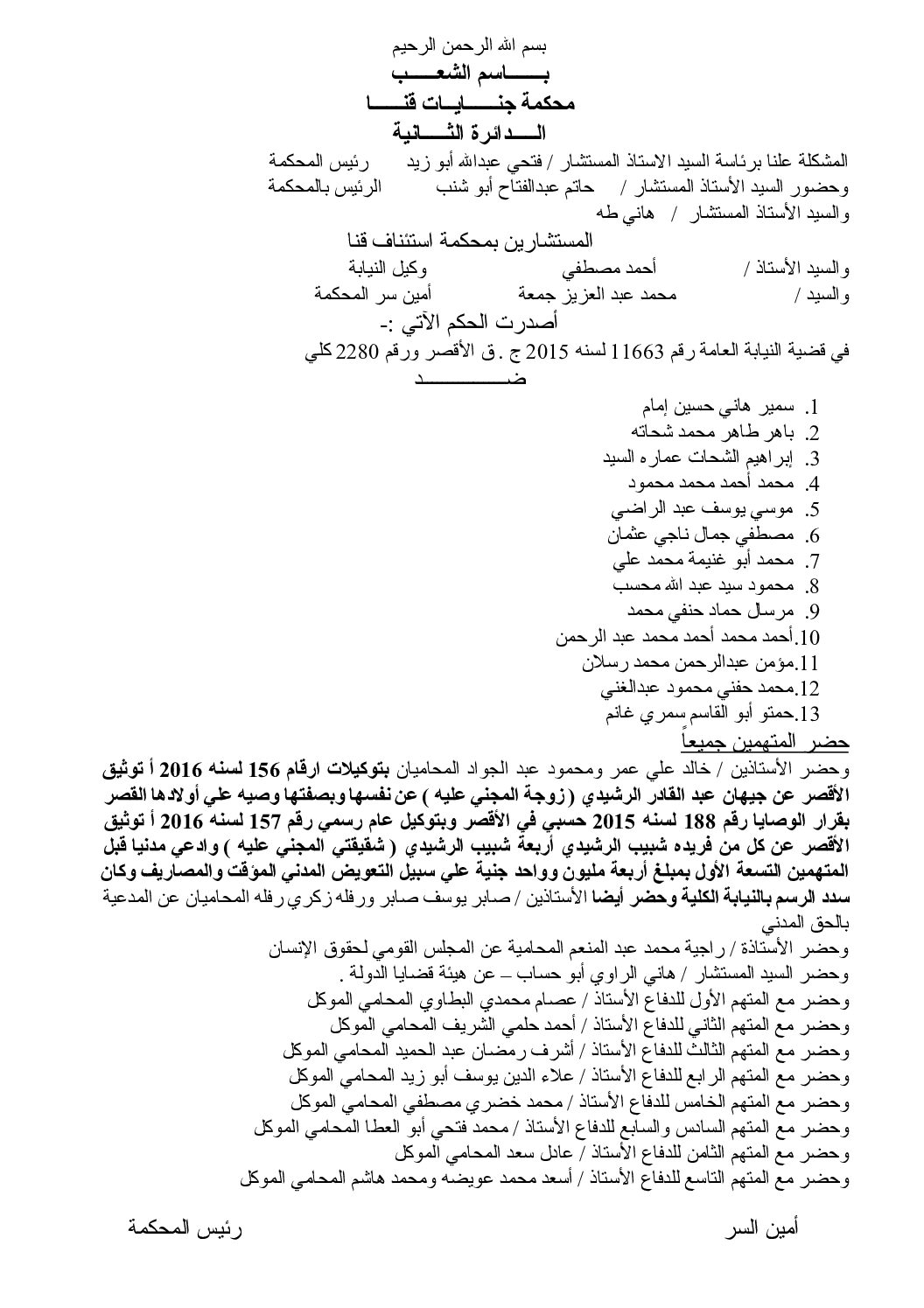Criminal justice | New Victory: Administrative Court Considers Jeka, Christie, Shafei and Makhlouf Revolution Victims

Three of the victims killed under Morsi and the fourth under SCAF
The Administrative Court of Justice held yesterday, December 16, that Jaber Salah Jaber, known as Jeka, Mohammed Hussein Korny, known as Christie, Mohamed El-Shafei, and Ali Hassan Makhlouf are victims of the revolution. The ruling has been based on the recommendations of the Body of Commissioners in favor of the victims.
In collaboration with the law office of Khalid Ali, the Egyptian Center for Economic and Social Rights has lodged lawsuits on behalf of the victims’ families and against the President of the Republic, the Prime Minister, the Minister of the Interior and the Secretary General of the National Council for the Care of the Families of Victims and Injured, each in his capacity. The defense team demanded enrolling the four names in the lists of the revolution victims and the abolition of the negative decisions and their consequent effects. These lawsuits have been lodged as part of a series of lawsuits filed by the Center on behalf of many of those who were killed and injured during the revolution clashes since its outbreak in January 25, 2011 and until now. All of them claim the victims’ rights to be compensated by the state, and particularly the right to be officially considered revolution’s victims like their predecessors who officially listed as victims. The lawsuits were lodged as an attempt to forbid those in power from subjectively considering some as victims and others not, depending on the changing political circumstances.
Gaining their rights to be officially enrolled as victims is a first step on the road to recover their rights, and the rights of other victims, as well as the right of our homeland to bring the killers, who are still at large and killing more victims and suppressing more innocent people, to justice.
Victims
Jeka
The victim Jaber Salah Jaber, known as Jeka, was shot dead during his participation in the first anniversary of the Mohamed Mahmoud Street clashes in November 20, 2012. The security forces had used excessive force and live bullets to disperse the demonstrations at the behest of the then Interior Minister Ahmad Jamal al-Din who served under the removed President Mohamed Morsi.
Christie
The victim Mohamed Hussein Korny, known as Christie, was shot dead in the head and chest at the hands of the security forces during Kasr Atahadia demonstration on February 1, 2013. They used live bullets on the orders of the current Interior Minister Mohamed Ibrahim, who was the second interior minister to serve under the removed President Mohamed Morsi.
Mohamed Shafie
The victim Muhammad Shafie died after being tortured and injured in different parts of his body. He was kidnapped during his participation in the revolution’s second anniversary in Tahrir Square in January 2013, under the removed President Morsi
Ali Hassan Makhlouf
He was shot dead during the Interior Ministry neighborhood clashes which erupted after the football fans massacre in Port Said in February 2012. The police brutality had been exercised by using live bullets, which killed Makhlouf among others, under the Military Council rule.
Court ruling
The Administrative Court verdict has been made to compensate the four victims and their families, who deserve moral and symbolic as well as financial compensation for the loss of their beloved sons. More importantly, the verdict has also come to reveal a legal flaw in dealing with the cases of those who paid their blood for the imposition of the will of the people against the tyranny of the ruling military council and the rule of Morsi, the first elected civilian president, who got rid of the principles of the revolution that drove him to power. The legal procedures were marred by political considerations rather than the facts and logic. The process ignored the role of the Interior Ministry and its two ministers under the removed president Morsi, who used lethal force against his opponents and peaceful protesters. Although the Administrative Court’s ruling came to prove that they were victims of the revolution, the criminal responsibility is still absent and the offenders still in office.
While Mohamed Morsi is on trial, his Interior Minister, Mohamed Ibrahim, still occupies his office in spite of his responsibility for killing dozens of victims during the revolution against the removed President. Holding his position as an Interior Minister, Ibrahim uses excessive force against demonstrators and protesters, adding to his record hundreds of victims. No officer or other police personnel who have directly killed protesters were mentioned in the public prosecution investigations so far.
The court verdict has several connotations: First, the January 25 revolution hasn’t come to an end, neither by the ouster of former President on February 11, 2011, nor when the first civilian president assumed power in July 2012, and not even after removing him one year later in July 2013. The revolution will continue as long as it is defended by blood and sacrifice. Second, whatever the flaws of the judiciary may be in dealing with the victims lawsuits, it remains one of the important tools that is indispensable for getting rights. There is no alternative to the rule of law as a pillar indispensable for the state of rights and freedoms that we all look forward to, and which contains the goals of the January 25 Revolution and the dreams and aspirations of the Egyptian people, the sole owner of the revolution.
A series of victims lawsuits filed by ECESR
It is worth mentioning that the appeals made by ECESR lawyers for the reinstatement of victims are part of the continued efforts to defend the rights of the victims and injured, who have been overlooked by the state. In this regard, ECESR lawyers have lodged a large number of appeals before the administrative court, which handed down a verdict in one of them and enrolled Mustafa Yahya Hassan in the victim list. He was killed in the Israeli embassy clashes on September 9, 2011. The other claims waiting for the Administrative Court to decide on cover many governorates and clashes under the successive periods: the Military Council, the removed President Mohamed Morsi, the transitional period, and the second President-elect Abdel Fattah al-Sisi.
State responsibility
Not only do the Administrative Court of Justice and the reports of the State Commissioners correct a wrong situation and restore the rights of victims and the injured, but it goes beyond that to establish important principles which oblige the state to recognize the security forces’ excessive use of violence in response to protests. This, of course, emphasizes the inalienable right to peaceful demonstration and the criminalization of the security forces upon suppressing this right. The continuation of ECESR in defending the rights of all the victims overlooked by the state, does not negate the need for the state itself to be involved and take the initiative to enroll all the overlooked victims in accordance with the Constitution and the law in this regard. It should also emphasize the urgent need to re-consideration of the right to peaceful protest and ensuring the protection of demonstrators as determined by the international covenants and conventions, as well as the Egyptian constitution. In this regard, we reiterate our demand to stop the application of the repressive law issued by the Transitional Authority and used to justify the use of violence against demonstrators. It is used to legally hunt them down and arrest many of them in an attempt to undermine the freedoms and rights of the Egyptian citizen.

